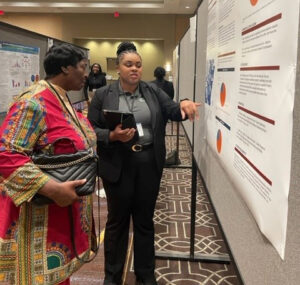SUPER Project Students Present Work at Health Disparities Conference
| Staff and faculty members from the University of Arkansas for Medical Sciences (UAMS) Division for Diversity, Equity and Inclusion (DDEI) joined SUPER Project participants at a conference in New Orleans that offered the students an opportunity to present their research on health disparities.
The Serving Underrepresented Populations through Engagement and Research (SUPER) Project, part of DDEI’s HBCU Med Track Program through Health Career University, teaches students from state and regional colleges about what it means to be community engagement researchers. The students’ work focuses on health disparities that affect underserved populations.
Their projects led them to the Xavier University of Louisiana Health Disparities Conference, an annual event attended by clinicians, health leaders, educators and students who strive to build partnerships for achieving health equity. Four SUPER Project students presented their work at this year’s conference.
Kennedy Hicks, a sophomore at the University of Arkansas-Fayetteville, conducted research on the relationship between school district educational resources, student outcomes and socioeconomic status. She said she received helpful feedback on how to proceed with her project, and she gained additional learning opportunities from listening to her fellow presenters.
“The conference had great speakers and presentations about a wide range of topics, addressing public health concerns and ways to overcome barriers within the health care system,” she said. “I truly enjoyed the entire experience.”
The SUPER Project group attended several of the conference’s workshops, including one that focused on ways to train and engage professionals to address health disparities. This session was particularly meaningful for the students, tying in with their efforts as developing researchers.
“The information shared at the conference was informative and inspiring,” said Genesis Jackson, a junior from the University of Arkansas at Pine Bluff who gave a presentation on diet-based intervention for diabetes prevention and management in rural southeast Arkansas.
This year’s event marked the first conference presentation for Colby Wilson, a junior at the University of Central Arkansas who shared his findings from a project on the relationship between oral health and erectile dysfunction. Wilson said the students’ work drew strong praise from conference attendees, and he expressed gratitude for the opportunities the SUPER Project has provided.
“I always tell people that the SUPER Project changed my life, and I don’t mean that figuratively,” Wilson said. “This program put me in spaces with people who have become lifelong mentors. They’ve built me up and helped me gain confidence.”
Ciara Jenkins, a student at Philander Smith College, presented a project titled, “The Lack of Healthy Food Options at an HBCU in Arkansas.” Caleb Gabriel and D’Nyla Dean, both from Dillard University in Louisiana, and Kandace Jimmerson of UAPB also attended the conference as members of the SUPER Project.
Students in the program worked with mentors who helped them complete their projects. Hicks’ mentors were Clare Brown, Ph.D., MPH, assistant professor in the UAMS Fay W. Boozman College of Public Health, and Katina White, education coordinator for DDEI’s Pathways Academy; Jackson’s was Zeeshan Habeeb, Ph.D., assistant professor of physical chemistry at UAPB; Jenkins’ were Brown and Grover Miller, Ph.D., professor in the UAMS College of Medicine’s Department of Biochemistry and Molecular Biology; and Wilson’s was Tremaine Williams, Ed.D., assistant professor in the College of Medicine’s Department of Biomedical Informatics and assistant dean of the UAMS Graduate School.
Gloria Richard-Davis, M.D., MBA, executive director of DDEI, said the conference provided an exciting opportunity for students to engage with researchers from across the country.
“The Health Disparities Conference allowed our SUPER students to present their work in a national forum,” she said. “It reaffirmed that their research matters, and it encouraged them to look deeper at our communities’ health inequities. It opened their eyes to new possibilities.”

